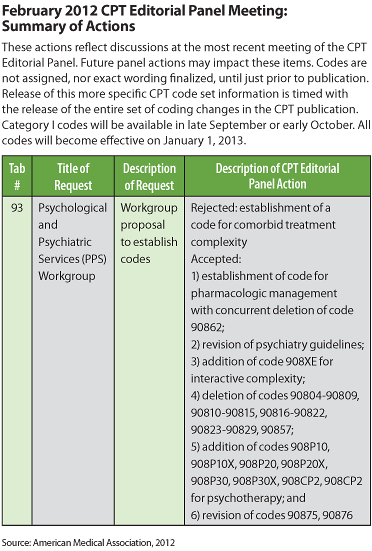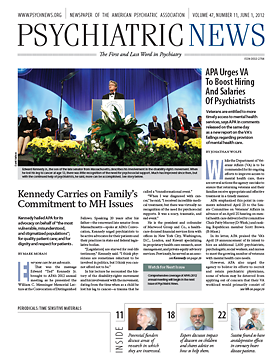Big changes are in the works for how psychiatrists code for their services, including deleting many familiar codes, revising some current codes, and creating new codes to more accurately reflect the way psychiatry is practiced today.
After a review of codes in the psychiatry section of
Current Procedural Terminology (CPT)—the handbook of codes used by all physicians to receive reimbursement for services—the AMA CPT Editorial Panel has approved a number of important changes, including the elimination of code 90862 for pharmacologic management (see table). Staff of APA’s Office of Healthcare Systems and Financing pointed out that general Evaluation and Management (E&M) codes can be used by psychiatrists to describe the work of this service now. Members are urged to familiarize themselves with the E&M codes by visiting APA’s online course on E/M coding at
www.apaeducation.org.Ronald Burd, M.D., chair of APA’s Committee on RBRVS, Codes, and Reimbursement and a participant in the review process, said that in all likelihood a new coding structure will be instituted that will include—like the E&M codes available to all physicians (99xxx series codes)—levels of complexity that will make it possible to more accurately capture clinical work with psychiatric patients.
APA is undertaking outreach to commercial and public payers to ensure that they are aware of the coming changes and will be prepared to reimburse appropriately under the new codes.
The new coding framework is the product of an AMA-convened work group that included representatives from the AMA CPT panel, APA, American Academy of Child and Adolescent Psychiatry, American Nurses Association, American Psychiatric Nurses Association, American Psychological Association, and National Association of Social Workers. APA provided leadership in the shaping and development of the codes that will describe the work of psychiatrists, advanced-practice nurses, psychologists, and social workers.
The AMA has released only general information about the code changes, and those who participated in the code review process are bound by a confidentiality agreement not to reveal any more information about the new coding until the 2013 CPT book is published by the AMA, which is anticipated in September or October.
Although the changes have been accepted by the CPT Editorial Panel and recommended values for the new codes have been made to the Centers for Medicare and Medicaid Services (CMS) by the AMA’s Resource-Based Relative Value Update Committee (RUC), CMS has the ultimate say in accepting or modifying the RUC’s recommendations before valuation of the new codes is final in November.

Look to APA’s Web site and Psychiatric News for coverage of these changes as they become public.

